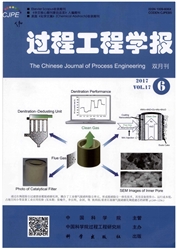

 中文摘要:
中文摘要:
对天然气水合物热开采技术的研究进展进行了综述,概括了热开采技术研究的基础实验和数值模拟,分析了天然气水合物分解动力学研究,传热、传质对分解的影响及多孔介质和水合物地层中水合物开采规律.研究表明,热开采技术作为强化供热开采方案,可弥补常规开采效率低的缺点;对水合物分解热力学和动力学的实验研究已能满足对水合物热力分解认识的基本要求,但沉积物内的水合物热力学性能研究尚需深入;模型研究已从一维单相发展到复杂的三维多相数值模型,通过单个或多个模型的综合分析已能达到实际水合物藏开采计算的要求.最后指出了热开采天然气水合物尚存在的问题和研究方向.
 英文摘要:
英文摘要:
The thermal recovery method, as one of alternative exploitation schemes for natural gas hydrates in future, has attracted more attentions. This paper has reviewed the advance on the thermal recovery of gas hydrate in both basal experiment researches and numerical simulation. The decomposition kinetics of hydrate, effects of heat transfer and mass transfer on the dissociation, and the production principles in porous media and hydrate reservoir all are elaborated. Thermal recovery technology as a method of enhanced heat production could make up the disadvantage of general exploitation with low efficiency. Although the experimental study of thermodynamics and kinetics of hydrate dissociation has been well improved to interpret the thermal decomposition behaviors, the research on thermal properties of hydrate-bearing sediment is still absent. The numerical models, developed from single-phase 1D to complex multi-phase 3D, are able to achieve simulation of accurately field-scale hydrate reservoir. Finally, the research direction of gas hydrate by thermal stimulation is also pointed.
 同期刊论文项目
同期刊论文项目
 同项目期刊论文
同项目期刊论文
 Numerical investigation on drag reduction with superhydrophobic surfaces by Lattice-Boltzmann method
Numerical investigation on drag reduction with superhydrophobic surfaces by Lattice-Boltzmann method Application of field synergy principle analysis in forced convection heat transfer processes in micr
Application of field synergy principle analysis in forced convection heat transfer processes in micr Kinetics of Coupling Water and Cryoprotectant Transport across Cell Membranes and Applications to Cr
Kinetics of Coupling Water and Cryoprotectant Transport across Cell Membranes and Applications to Cr A numerical study on heat transfer performance of microchannels with different surface microstructur
A numerical study on heat transfer performance of microchannels with different surface microstructur Two applications of the thermogram of the alcohol/water binary system with compositions of cryobiolo
Two applications of the thermogram of the alcohol/water binary system with compositions of cryobiolo 期刊信息
期刊信息
